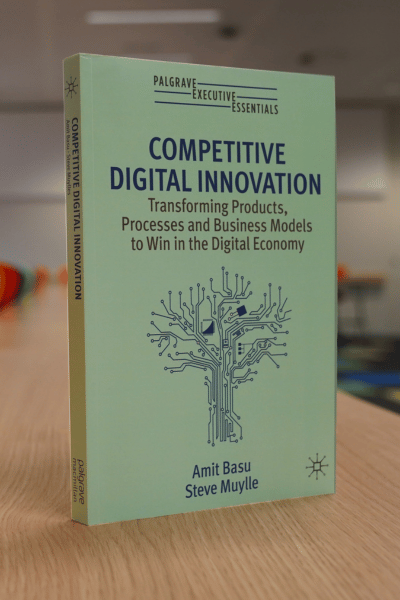BlueSky BookShelf Meets: Steve Muylle and Amit Basu
Competitive Digital Innovation – Transforming Products, Processes, and Business Models to Win in the Digital Economy

As e-commerce platforms like Amazon and Walmart continue to invest heavily in digital technologies and expand their online products to include healthcare, grocery shopping and more, traditional in-store retailers face declining sales and foot traffic. Many have failed to adapt, resulting in store closures and layoffs. In contrast, digitally-empowered retailers are harnessing data analytics, online marketing, and e-commerce to not only survive but thrive in the evolving landscape.
‘Competitive Digital Innovation – Transforming Products, Processes, and Business Models to Win in the Digital Economy’ by Professors Amit Basu, Cox School of Business at Southern Methodist University, and Steve Muylle, Vlerick Business School, looks to be a valuable resource in navigating a complex digital landscape for both individuals and businesses alike. The authors discuss their book’s inspiration, key takeaways, target audience, practical tips, real-world examples, and how it expands existing discussions on the topic.
Can you tell us about the inspiration behind your new book? What motivated you to write it?
The inspiration for our book came from our deep-rooted belief in the transformative power of digital technologies. We were motivated by the realisation that many companies still struggle to harness digital innovation effectively to remain competitive in a rapidly evolving digital economy. We wanted to share our knowledge and insights, gained through years of research and digitalisation projects with a wide variety of companies worldwide, to help businesses embrace digital innovation strategically and successfully.
What are the key takeaways or main ideas that readers can expect to find in your book?

In our book, readers will find a comprehensive roadmap for leveraging digital technologies to gain a competitive edge. We emphasise that competitive digital innovation isn’t just about buying new technology; it’s about using technology to transform market-facing processes, products, services, and business models. We provide a conceptual framework to identify, prioritise, operationalise, and evaluate competitive digital innovation opportunities, as well as real-world examples to illustrate these concepts in action.
Who is the target audience for your book, and how do you believe it will benefit them?
We have targeted a broad audience, including CEOs, senior executives, managers, students, and anyone interested in the application of digital technology to business. And it’s for both the start-up founder, as well as the multinational corporate director, offering each of them relevant and practical insights. We believe that readers will learn how to navigate the digital landscape and adapt their strategies to drive competitive digital innovation.
What do you think makes this topic particularly relevant or timely in today’s business world, or for the years ahead?
The digital economy is continuously evolving, and our book addresses the pressing need for businesses to stay competitive in this dynamic environment. The COVID-19 pandemic highlighted the stark differences between digitally advanced companies and those playing catch-up, and this has only been accelerated by recent AI developments. Competitive digital innovation is vital for long-term success and resilience, making this topic exceptionally timely and relevant.
Please share some practical tips or strategies from your book that readers can immediately apply to improve their business or career?
One crucial takeaway from our book is that digital innovation is not just about automation. We also emphasise that digital technology can transform nearly every aspect of a business. We then provide guidance to readers on how businesses can compete more effectively by digitally innovating their products, processes, and business models.
Can you discuss any specific case studies or real-world examples from your book that illustrate its principles in action?
We extensively discuss compelling examples from various industries and markets around the world to showcase the concepts discussed in the book. Many of these examples are drawn from companies we’ve worked with and are well-known in the business world. By exploring these extended examples, readers can see how different companies have navigated the digital landscape, learning valuable lessons from their experiences.
“One crucial takeaway from our book is that digital innovation is not just about automation. We also emphasise that digital technology can transform nearly every aspect of a business.”
How does your book add to/expand existing discussions on this topic?
Many books on digitalisation become quickly outdated due to changing technology. On the other hand, our exposition is based on concepts and principles that apply even beyond the technology we have today. For example, our ideas are also applicable to innovations based on recent developments such as generative AI that have gained significant attention.
Crucially, however, this is not simply a book on strategy. We chose to start with a discussion of competitive digital innovation to provide an understanding of the landscape before delving into the strategic considerations and tying it all together. This makes the book unique, and in our opinion more useful to practitioners.
Steve Muylle is a Partner, Associate Dean for Digital Learning, and Professor of Digital Strategy and Business Marketing, at Vlerick Business School. Amit Basu is an Endowed Professor and Department Chair in Management Information Sciences at Cox School of Business, Southern Methodist University.
Competitive Digital Innovation – Transforming Products, Processes, and Business Models to Win in the Digital Economy’ is available to buy now
Interested in this topic? You might also like this…
